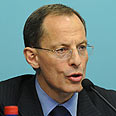
Prof. Kandel: PM didn't change perception
Head of National Economic Council gears up for shock waves from Europe, prepared for some 'adjustments' in Concentration Committee's recommendations. He also believes in holding off on making decisions, is happy he isn't the one making them
They are Israel's senior regulators: Commissioner of Capital Markets Oded Sarig, Supervisor of Banks David Zaken, and Chairman of the Concentration Committee Haim Shani.
As we enter the office, Kandel apologizes for the delay and tells us he just had another consultation meeting for the formulation of the Concentration Committee's final reports that are to be submitted in a month.
'Netanyahu responded appropriately'
In a few days, National Economic Council will submit its recommendations on the fund for the management of gas revenues based on the Sheshinski Committee recommendations to Prime Minister Benjamin Netanyahu.
The Council rejects out of hand criticism claiming it took far too long to form the recommendations, explaining that the work was exhaustive and examined existing funds.
Kandel is keeping the gas revenue recommendations close to his chest but reveals that they will not be directed at covering the NIS 600 billion ($160 billion) deficit, although both the government and Kandel reiterate the importance of covering the debt which is benefiting mainly foreign banks which fund it.
In line with the fiscal accountability you so often speak of, is it not imperative to channel the funds to cover the debt?
"Even households with a mortgage save for rainy days. They don't allot all of their funds to repay the mortgage. Liquidity is necessary. We need short-term liquidity for emergencies such as natural disasters or a deep financial crisis.
"If you refrain from using the money up right away, you can accrue assets which is more important that reducing debt, especially in a geo-political reality such as ours. Some of the proceeds will be channeled for fiscal purposes and the rest are earmarked for the fund."
When you were appointed in 2009, Netanyahu had a certain economic outlook which seems to be changing. For example, his valued regressive tax scheme was nixed. Have you personally witnessed the change?
"I don't believe people change their outlook, nor do I think there was a need to change it. The prime minister firmly believes that at the end of the day, it is the business sector that can pull economies out of the mud and raise value.
"Most of the time business bodies are more efficient than public entities because they are subjected to less self regulation. The government has to shackle itself because it deals with public funds that must be managed transparently, but often it over-shackles itself. A business organization is more efficient.
"This approach is not disputable if you believe that you wish to live where entrepreneurship and private proprietorship exist. The prime minister did not change this perception; he always maintained that he wishes to make Israel a good place for business.
"What happened was that we came to realize two things: the growth rate we were hoping for last year did not happen which is why resourced are diminished and that the public expressed certain preferences as regards the type if services it wishes to receive right now.
"The public debate in effect indicates that things are difficult for the public. A public representative who would ignore the protest would be misguided. The prime minister responded as he should have. He did not become a socialist and seek to nationalize everything, and it won’t happen, which this is why he was elected. He says that right now he would like to fix things and examined the effects.
"Aside from that, the Trajtenberg Report says that the corporate tax matter will be examined within three years. By the way, the prime minister has already begun dealing with the housing issue by adopting long and short-term policy tools, but there were discrepancies in the field.
"Following the low interest rates and poor investment alternatives, people viewed the real estate market as an El Dorado where there was gold in every flat which caused property prices to skyrocket. I see no dramatic changes in the Prime Minister's economic outlook."
How do you perceive the defense budget cut recommended by the Trajtenberg Committee which you were a member of?
"The prime minister continues to adopt the Trajtenberg Committee's recommendations and is doing so methodically. The cut will be advanced as recommended. If the security threat turns out to be more serious than we thought, I assume the government will have to respond without disregarding the social aspect.
"On the other hand, if economic trouble proves to be graver we will have to provide an answer for that. There is uncertainty on both sides. Transparency and control of all of the systems are extremely important because we need to know how much a budget cut or increase in the defense system costs."
Click here to read this report in Hebrew










